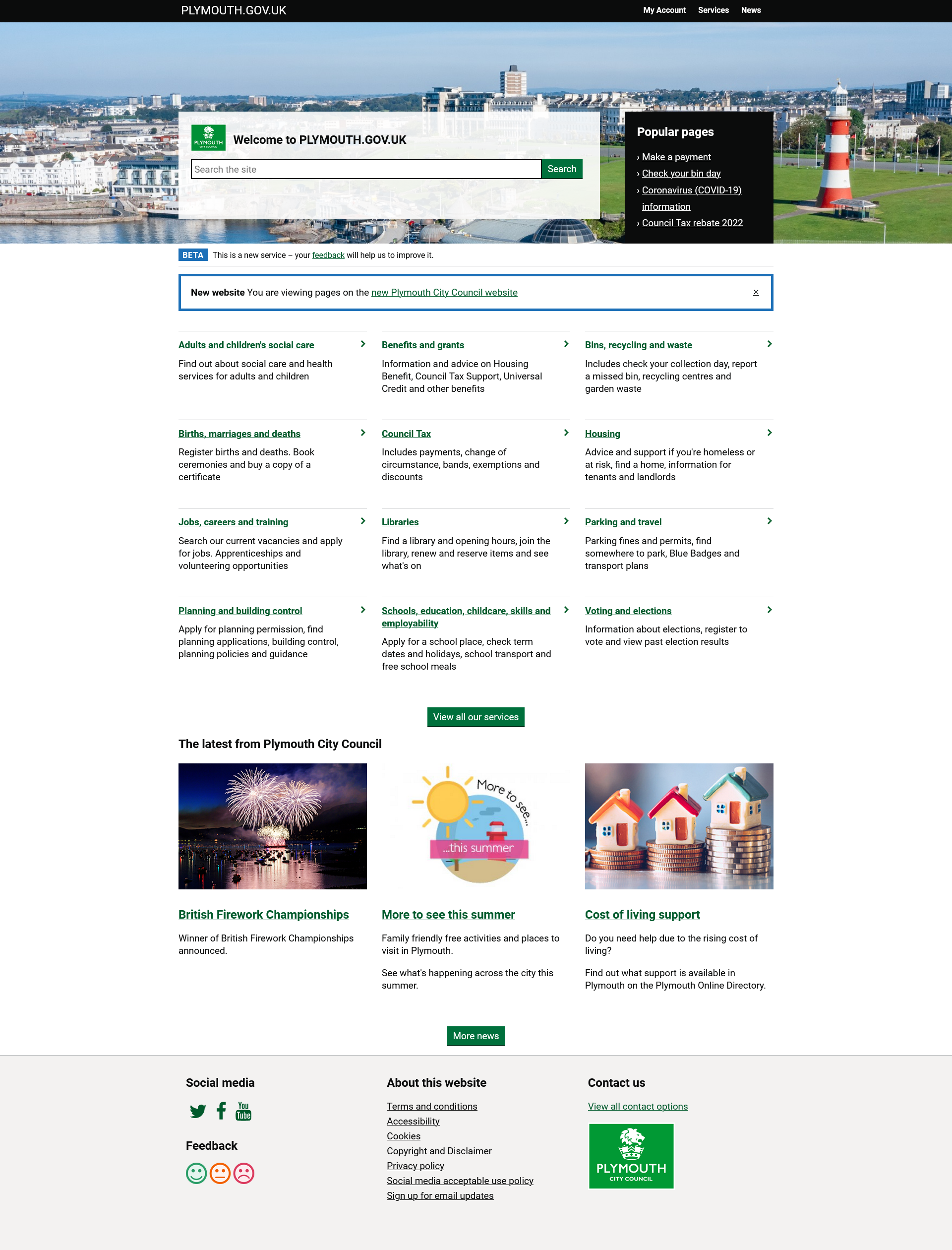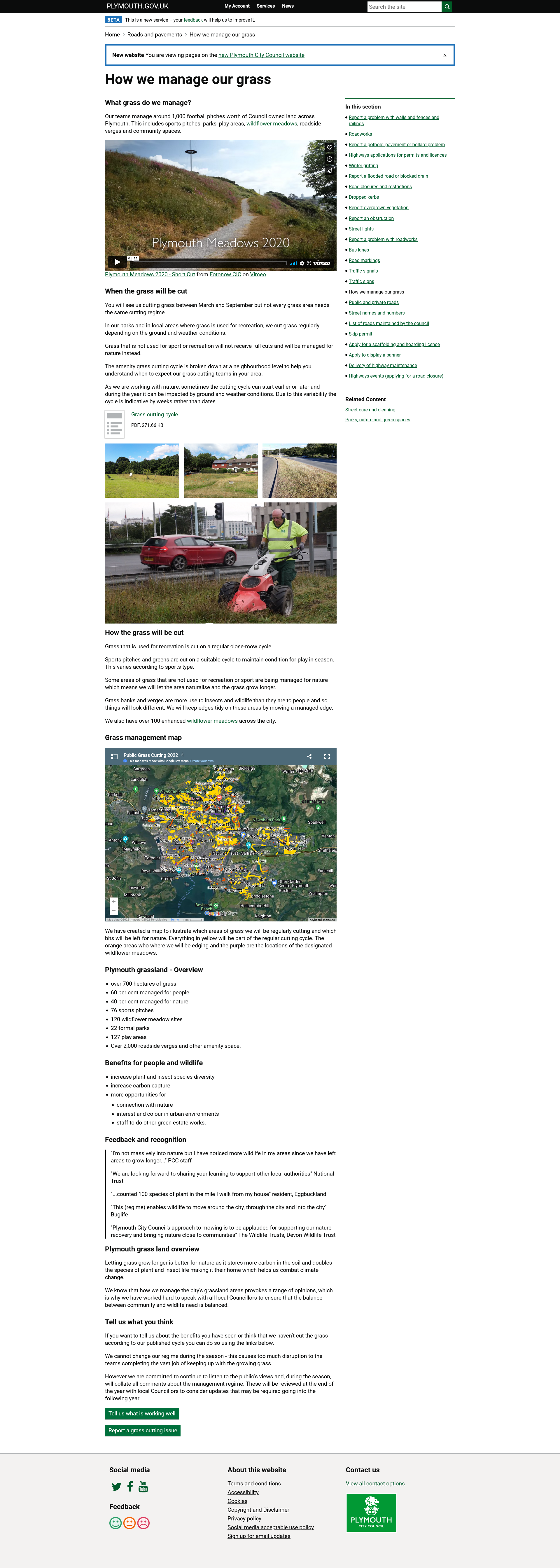Contents
"It has been a pleasure working with Billy and his team at Zodiac Media. We have migrated our site (approximately 5,000 pages) from Drupal 7 to Council Platform seamlessly with their knowledge and support. The automatic migration scripts significantly reduced our workload and the team at Zodiac were always on hand to promptly deal with any problems.
Council Platform is very user-friendly and makes editing content on our site easier than before. Zodiac Media are constantly updating the Council Platform to make improvements and align it with GOV.UK best practice. This commitment is echoed in their response to accessibility by regularly flagging any issues with us and ensuring Council Platform is accessible by design."
Plymouth City Council
The story of Plymouth’s move to Public Platform is very similar to that of North Herts Council’s. It wasn’t without its challenges though, as Plymouth’s content inventory was markedly more complex than that of North Herts.

An ageing Drupal 7 site
Plymouth City Council’s website was built using the Content Management System (CMS) Drupal 7 back in 2016 and the site had run its course. As Drupal 7 was originally slated to be ending its life in November 2022, Plymouth wanted to replace their Drupal 7 site before this deadline arrived. This would ensure their site remained secure. As fate would have it, earlier this year the Drupal Steering Group postponed the end of life for Drupal 7 by one year, but it made sense to progress with the site rebuild regardless. This is because Drupal 7’s eventual end of life is only a matter of time, and the reality is that the Drupal community has long since moved on as Drupal 7 was released in 2011.
We had been hosting the existing Plymouth Drupal 7 site since 2017, and - having completed a near identical project for North Herts Council - we were able to offer a low risk, tried and tested route to rebuilding Plymouth’s website using Public Platform.
Content rationalisation, a “zero cost” implementation, and a full automated migration
We followed the same process as our rebuild of North Herts Council’s website.
The starting point was spinning up a “zero cost” implementation of Public Platform, which combines the default GOV.UK look and feel of our demo site with the brand colours and typography of Plymouth City Council. This was completed in 1 working day and the site was then immediately ready for content population.
Plymouth opted for an automated content migration, which is something we now recommend for all clients we onboard. This is because the alternative manual migration is hugely time-consuming for council staff. And unless there are significant resources allocated to the project, then by the time the last content item is ready to go live, the items migrated at the start of the process are out of date and require review.
Plymouth had a more complex content inventory than North Herts, comprising around 6000 content items spread across 38 content types. As part of our initial project planning, we were able to identify 23 content types that could either be dropped entirely. The remaining 15 content types to be migrated mapped across to only 6 content types in Public Platform. This reduction in content types was possible due to the flexibility of Public Platform’s WYSIWYG editor, as it supports varied page templates without resorting to the creation of new content types. Typically, we find that over 90% of a site’s content can be created using just the ‘Informational Page’ content type of Public Platform, such is its flexibility.
Despite the reduction in content types, the migration was still very complicated. On top of the content items in the original Drupal 7 site there were users, taxonomy terms, files, content revisions, URL aliases and URL redirects to migrate across. As we had access to the database of the Drupal 7 site, we opted to create a suite of 41 migration scripts to migrate all useful data from the Drupal 7 site to Public Platform. In total there were 70,000 items to migrate and once the migration scripts had run, the resulting database in Public Platform had more than 600,000 rows in it.
A phased beta go-live
Much like North Herts, Plymouth opted to make a small portion of their site live on Public Platform, whilst maintaining the bulk of content on the Drupal 7 site. This allowed Plymouth to gain early feedback on their new site and adjust their approach accordingly. It also allowed Plymouth’s Digital Team to start using Public Platform’s admin system “in anger” earlier than they would otherwise, giving them insight into the power of the WYSIWYG editor, simplicity of the admin system and utility of the in-built accessibility tools.
Running two sites in parallel raises the challenge of how to make the setup seamless for end users. We created “redirect maps” on both the Drupal 7 site and the Public Platform site, which seamlessly shuttled users back and forth between the migrated “Council Tax” section and the rest of the site. The new Public Platform site was integrated with Granicus’s Forms system to capture feedback from users. We were also able to use a “whitelisting” system so that Plymouth’s staff could road test what was planned for release before it was made live for all users. This gave everyone involved with the project confidence that the steps in the phased migration would be error free.
The benefits
There are a lot of benefits with the move to Public Platform, but the headline ones would be:
- Simpler
- Clearer
- Faster
- More usable
- Better search functionality
- Easier to maintain

Use of Public Platform avoided lengthy site build and testing phases, and meant that Plymouth could concentrate on the content of their new site. This is a monumental task in itself, so not having to worry about bugs or delinquent development timelines is something that shouldn’t be taken for granted.
Further refinement of the process
Normally, case studies such as this gloss over the “challenges” that a project encounters, but we value the “lessons learnt” we glean from them. In this case, it’s a simplification of the content migration process.
Custom migration scripts mean you can transfer all the data of an existing site. But they can become extremely complex as a result. Through sheer will we made these work for Plymouth, but at times it felt like climbing Everest!
Subsequently, in other client projects, we’ve found that we can achieve a similar net result via using a “scraper and importer” type approach that pulls content through the frontend of existing sites. This limits the data retrieved to only that which is accessible to the end user, but given it’s the end user that really matters, this should be acceptable in most circumstances. This approach to content migration is much simpler than the “full” migration scripts we’ve used in the past. We’re putting this approach into practice with our ongoing site build for Brentwood Council, and the project is progressing very quickly as a result.